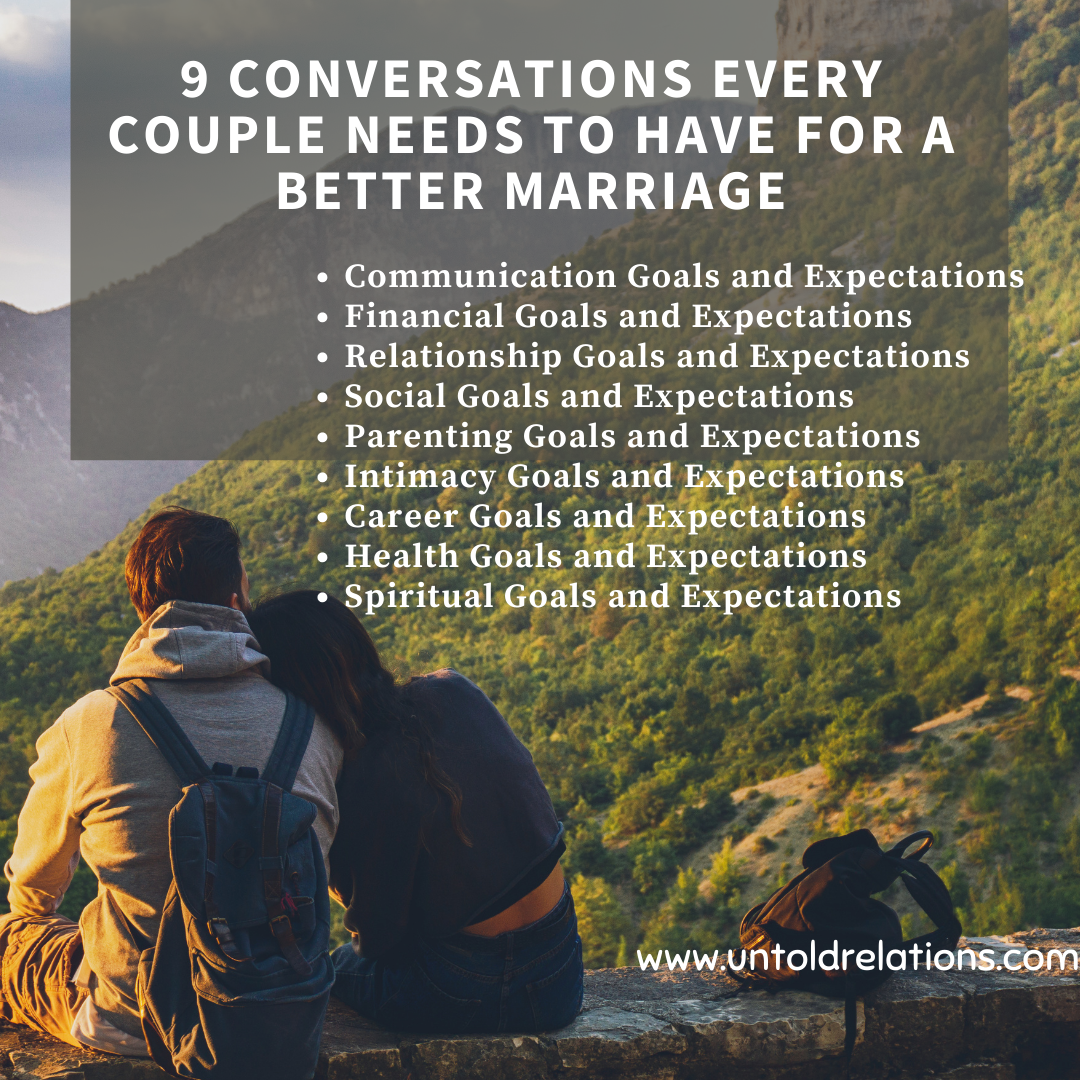Marriage is a wonderful union between two people who love each other, but it’s not always easy. A successful marriage takes work, communication, and a willingness to compromise. Having open and honest conversations with your partner is essential for a happy and healthy marriage. It helps to establish trust, build intimacy, and strengthen your relationship. In this context, we present 9 conversations every couple needs to have for a better marriage.

From expectations and communication to finances and family planning, discussing these topics can help you both better understand each other’s needs and work towards a common goal. Remember, these conversations are ongoing and should be revisited regularly to ensure that your marriage continues to thrive.
Communication Goals and Expectations
Discuss expectations and set communication goals in the relationship is really important. Talk about what each partner needs from the other, and set goals for communication. For example: “I want us to be able to talk about anything that’s bothering us” or “I need you to listen when I’m upset.” Then agree on how you will handle disagreements (for example, by listening first before responding).
Financial Goals and Expectations
Money is really very important in the relationship, this includes setting financial goals, discussing how you’ll handle your money as a couple, and agreeing on how you will resolve disagreements about spending. You might even want to write down some of these agreements so that they are easier for both of you to remember later on down the road when things get busy or stressful.
Relationship Goals and Expectations
It’s important to talk about expectations for the relationship. Are you looking for a long-term partner? Is this just a fling, or do you want something more serious? How many dates should we go on before we decide whether or not this is going anywhere? What are our goals for our future together, and how will we achieve them together as a couple?
Talking about these things openly can help both of you feel more secure in your relationship and keep any resentment from building up over time. You may also want to discuss each partner’s individual goals–for example, one person might want kids while another doesn’t–and agree on how best to handle conflicts when they arise (for example: “We’ll talk about it calmly rather than yelling at each other”). Finally, set an agreement on how often each person will show appreciation for their partner (for example: once per week).
Social Goals and Expectations
Discuss expectations for social activities. Talk about each partner’s goals for spending time with friends and family, as well as how much time you’d like to spend on your own. Set expectations for how you will handle social conflicts, such as who’s going where or what kind of behavior is acceptable at gatherings (e.g., no cell phones). Agree on how to show appreciation for each other when one person has made an effort to accommodate another’s preferences or needs in this area (e.g., “Thanks for going out tonight!”).
Parenting Goals and Expectations
It’s important to know what each partner wants out of parenting, as well as their expectations for how the other will help them achieve those goals. Are you both on board with having kids? If so, how many? When do you want them? How much time will each partner be spending with the children (and how much alone)? What kind of relationship do you want your child or children to have with their grandparents and other relatives? How will discipline work in this family–and who will do most of it? These are all questions worth discussing before having kids together.
Intimacy Goals and Expectations
Discuss expectations for intimacy. It’s important to set goals for physical and emotional intimacy with your partner, as well as how you’ll handle any conflicts that arise in this area of your marriage.
Set expectations for how to handle intimacy conflicts. You might decide that it’s okay if one partner wants more time alone than the other, but not okay if they don’t want sex when their spouse does. Or maybe one person wants more physical affection than the other person does–and vice versa! Whatever the case may be, talk about what each person needs from their spouse in order to feel loved and appreciated by them (even if those needs are different).
Career Goals and Expectations
It’s important to have an open and honest conversation about your career goals and expectations. This can be a difficult conversation, but it’s worth it! You’ll want to discuss like how you each feel about your current careers. What are the pros? Cons? What would make them better for you?
Your long-term career plans–what do you want from this job in 5 years or 10 years? Is there anything specific that would make working here more fulfilling for either partner (e.g., more time with family)? If so, how can we work together toward those goals while still being flexible enough if unexpected opportunities come along later on down the road (such as getting promoted)?
Health Goals and Expectations
Discuss expectations for physical and mental health is very important in the relationship. For example, you might decide that you want to lose weight or get in shape, or perhaps your partner has a health condition that requires monitoring and treatment. Talk about each partner’s goals for staying healthy, and set expectations for how to handle health conflicts (e.g., “If I’m sick or have an injury, I’ll let you know right away”). Also agree on how to show appreciation for each other when one of you takes steps toward bettering his/her own wellness (e.g., “I’m proud of the way you’ve been eating healthier lately–thank you!”).
Spiritual Goals and Expectations
Discussing spiritual beliefs is a great way to get started on a conversation about what your expectations are for each other’s spirituality, as well as your own. You can talk about how you want to grow spiritually together and how you’ll handle conflict when it comes up. Setting these goals will help keep your marriage strong, even when the going gets tough!
Approaches to Effective Communication in Marriage
Learn effective communication skills to enhance your relationship and strengthen your marriage:
- Start with an open mind and a willingness to listen to your partner’s perspective
- Find a time when you both are relaxed and not distracted by other things
- Use “I” statements to express your feelings and avoid blaming or accusing your partner
- Take turns talking and actively listening to each other
- Be honest and transparent about your thoughts and feelings
- Don’t be afraid to ask questions or seek clarification
- Be respectful and non-judgmental towards each other
- Be willing to compromise and find solutions that work for both of you
- Keep the conversation focused on the topic at hand and avoid bringing up unrelated issues
Remember that these conversations are ongoing and should be revisited regularly to ensure that your marriage continues to grow and evolve over time.
Tips for Creating a Safe and Supportive Environment for Relationship Conversations
Create a comfortable and respectful atmosphere for discussions, and look for professional help when needed, to ensure productive and healthy conversations in your relationship.
- It’s important to create a safe space for these conversations. Make sure you’re in a private setting where you won’t be interrupted, and where you both feel comfortable sharing your thoughts and feelings.
- Be patient and understanding with each other. It may take time to work through some of these conversations, and it’s important to respect each other’s pace.
- Avoid using negative language or engaging in name-calling. This will only escalate the situation and make it harder to have a productive conversation.
- Don’t be afraid to seek help from a professional counselor or therapist if needed. Sometimes, having a neutral third party can help facilitate these conversations and provide new insights and perspectives.
These conversations are about building a stronger relationship, not about assigning blame or finding fault. Focus on finding solutions that work for both of you, rather than trying to prove that one person is right and the other is wrong.
Final Thought
Having open and honest conversations is crucial for building and maintaining a strong and healthy marriage. While it may be difficult to discuss certain topics, it is important to approach these conversations with patience, understanding, and respect for each other’s perspectives. By creating a safe and supportive environment for communication, and seeking help from a professional when needed, couples can work through their differences and find solutions that work for both partners, leading to a happier and more fulfilling relationship.



0 Comments